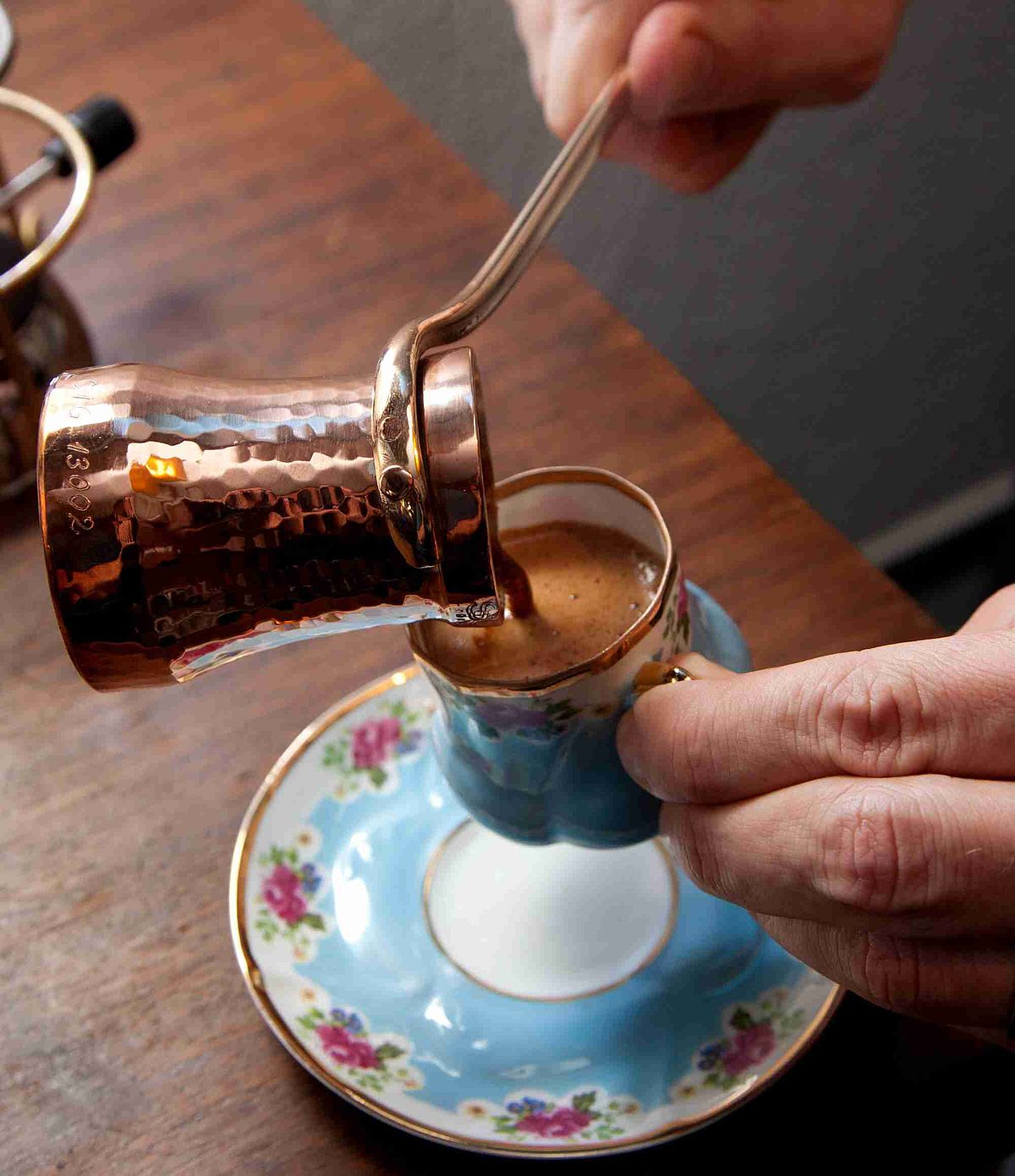Turkish coffee - Wikipedia
Your folders
Your folders

Ingredients
Export 2 ingredients for grocery delivery
Instructions
^ .mw-parser-output cite.citation{font-style:inherit}.mw-parser-output .citation q{quotes:"\"""\"""'""'"}.mw-parser-output .id-lock-free a,.mw-parser-output .citation .cs1-lock-free a{background:linear-gradient(transparent,transparent),url("//upload.wikimedia.org/wikipedia/commons/6/65/Lock-green.svg")right 0.1em center/9px no-repeat}.mw-parser-output .id-lock-limited a,.mw-parser-output .id-lock-registration a,.mw-parser-output .citation .cs1-lock-limited a,.mw-parser-output .citation .cs1-lock-registration a{background:linear-gradient(transparent,transparent),url("//upload.wikimedia.org/wikipedia/commons/d/d6/Lock-gray-alt-2.svg")right 0.1em center/9px no-repeat}.mw-parser-output .id-lock-subscription a,.mw-parser-output .citation .cs1-lock-subscription a{background:linear-gradient(transparent,transparent),url("//upload.wikimedia.org/wikipedia/commons/a/aa/Lock-red-alt-2.svg")right 0.1em center/9px no-repeat}.mw-parser-output .cs1-subscription,.mw-parser-output .cs1-registration{color:#555}.mw-parser-output .cs1-subscription span,.mw-parser-output .cs1-registration span{border-bottom:1px dotted;cursor:help}.mw-parser-output .cs1-ws-icon a{background:linear-gradient(transparent,transparent),url("//upload.wikimedia.org/wikipedia/commons/4/4c/Wikisource-logo.svg")right 0.1em center/12px no-repeat}.mw-parser-output code.cs1-code{color:inherit;background:inherit;border:none;padding:inherit}.mw-parser-output .cs1-hidden-error{display:none;font-size:100%}.mw-parser-output .cs1-visible-error{font-size:100%}.mw-parser-output .cs1-maint{display:none;color:#33aa33;margin-left:0.3em}.mw-parser-output .cs1-format{font-size:95%}.mw-parser-output .cs1-kern-left,.mw-parser-output .cs1-kern-wl-left{padding-left:0.2em}.mw-parser-output .cs1-kern-right,.mw-parser-output .cs1-kern-wl-right{padding-right:0.2em}.mw-parser-output .citation .mw-selflink{font-weight:inherit}"Getting Your Buzz with Turkish coffee". ricksteves.com. Retrieved 19 August 2015. ^ Brad Cohen. "The complicated culture of Bosnian coffee". BBC Travel. Retrieved 19 August 2015. ^ Nisan Agca (22 November 2017). "Making Turkish Coffee with a Turkish Barista Champion". =Resources.urnex.com. Retrieved 5 May 2018. Some supermarkets sell coffee that is pre-ground, marketed as Turkish coffee, and usually robusta. ^ a b Freeman, James; Freeman, Caitlin; Duggan, Tara (2012-10-09). The Blue Bottle Craft of Coffee: Growing, Roasting, and Drinking, With Recipes. Ten Speed Press. ISBN 978-1-60774-118-3. ^ a b c Basan, Ghillie. The Middle Eastern Kitchen. New York: Hippocrene Books. p. 37. ISBN 978-0-7818-1190-3. ^ a b Akin, Engin (2015-10-06). Essential Turkish Cuisine. Abrams. ISBN 978-1-61312-871-8. ^ Inc, Fodor's Travel Publications; Hattam, Jennifer; Larson, Vanessa; Newman, Scott (2012). Turkey. Fodor's Travel Publications. ISBN 978-0-307-92843-6. ^ Basan, Ghillie. Classic Turkish Cookery. I.B. Tauris. p. 218. ISBN 1860640117. ^ Sejal Sukhadwala. "Where To Drink Coffees From Around The World In London". Londonist. Retrieved 26 October 2018. ^ "The starting point of Turkish coffee: Istanbul's historic coffeehouses". The Istanbul Guide. Retrieved 26 October 2018. ^ Gannon, Martin J. (2004). Understanding Global Cultures: Metaphorical Journeys Through 28 Nations, Clusters of Nations, and Continents. SAGE. ISBN 978-0-7619-2980-2. ^ Nissenbaum, Dion (20 July 2007). "Coffee grounds brewed trouble for Israeli fortuneteller". McClatchyDC. Retrieved 27 November 2014. ^ Köse, Nerin (nd). Kula Düğün Gelenekleri. Ege University. (2008) ^ Armenia. Bradt Travel Guides. 2019. p. 104. ^ "A Forgotten Armenian History on a Small Greek Island". The Armenian Weekly. ^ Percy, Reuben; Percy, Sholto (1823). The Percy Anecdotes: Conviviality. T. Boys. ^ Broglin, Sharon; Museum, Allen Park Historical (2007-05-09). Allen Park. Arcadia Publishing. ISBN 978-1-4396-1884-4. ^ LAZAROVÁ Daniela, Czech baristas compete in the art of coffee-making, Radio Prague, May 12, 2011. ^ Piccolo neexistuje, Turek. ^ "Kawa po turecku – jak ją parzyć?". ottomania.pl. Retrieved 6 December 2019. ^ TV3.lt, Lietuviška kava griauna mitus: lenkia italus, vejasi pasaulio geriausius, retrieved February 16, 2018. ^ a b Leonidas Karakatsanis, Turkish-Greek Relations: Rapprochement, Civil Society and the Politics of Friendship, Routledge, 2014, ISBN 0415730457, p. 111 and footnote 26: "The eradication of symbolic relations with the 'Turk' was another sign of this reactivation: the success of an initiative to abolish the word 'Turkish' in one of the most widely consumed drinks in Greece, i.e. 'Turkish coffee', is indicative. In the aftermath of the Turkish intervention in Cyprus, the Greek coffee company Bravo introduced a widespread advertising campaign titled 'We Call It Greek' (Emeis ton leme Elliniko), which succeeded in shifting the relatively neutral 'name' of a product, used in the vernacular for more than a century, into a reactivated symbol of identity. 'Turkish coffee' became 'Greek coffee' and the use of one name or the other became a source of dispute separating 'traitors' from 'patriots'." ^ Mikes, George (1965). Eureka!: Rummaging in Greece. p. 29. Their chauvinism may sometimes take you a little aback. Now that they are quarrelling with the Turks over Cyprus, Turkish coffee has been renamed Greek coffee; ... ^ Browning, Robert (1983). Medieval and Modern Greek. p. 16. ISBN 0-521-29978-0. ^ a b Joanna Kakissis, "Don't Call It 'Turkish' Coffee, Unless, Of Course, It Is", The Salt, National Public Radio 27 April 2013: '"It wasn't always this way," says Albert Arouh, a Greek food scholar who writes under a pen name, Epicurus. "When I was a kid in the 1960s, everyone in Greece called it Turkish coffee." Arouh says he began noticing a name change after 1974, when the Greek military junta pushed for a coup in Cyprus that provoked Turkey to invade the island.' "The invasion sparked a lot of nationalism and anti-Turkish feelings," he says. "Some people tried to erase the Turks entirely from the coffee's history, and re-baptized it Greek coffee. Some even took to calling it Byzantine coffee, even though it was introduced to this part of the world in the sixteenth century, long after the Byzantine Empire's demise." By the 1980s, Arouh noticed it was no longer politically correct to order a "Turkish coffee" in Greek cafes. By the early 1990s, Greek coffee companies like Bravo (now owned by DE Master Blenders 1753 of the Netherlands) were producing commercials of sea, sun and nostalgic village scenes and declaring "in the most beautiful country in the world, we drink Greek coffee."' ^ Cohen, Brad (2014-07-16). "The complicated culture of Bosnian coffee". BBC - Travel: Food & Drink. Retrieved 2014-07-24. ^ http://www.fidanoski.ca/Macedonia/Turskokafe.htm ^ Turska Kafa: Serbian Turkish-Style Coffee